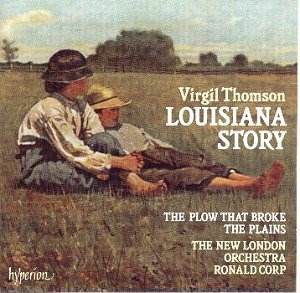Virgil THOMSON Louisiana
Story; The Plow that Broke the
Plains  Ronald Corp conducts The New London
Orchestra
Ronald Corp conducts The New London
Orchestra  HYPERION
CDA66576 [68:06]
HYPERION
CDA66576 [68:06]

Note: This is an established release - it was recorded in
1991
Not surprisingly Hollywood preferred to keep its film music composers close
to. For composers who had other fish to fry - like Aaron Copland, Leonard
Bernstein and Virgil Thomson life isolated in LA would have been intolerable
and I feel sure that the outspoken Thomson would have given producers short
shrift. This probably explains why Copland and Bernstein wrote so little
for the screen (Bernstein contributing to only On The Waterfront).
It is therefore interesting and significant that Virgil Thomson's music was
for non-Hollywood films. It is also significant that Thomson's music was
quite untypical for its day, for he eschewed the European Romantic tradition
of Korngold and Steiner, in favour of a definitive American musical voice.
Thomson's best-known film score and probably the most popular of all his
works is that for Robert Flaherty's Louisiana Story (1948)
which was about the invasion of oil prospectors into a young boy's idyllic
rural family life. Thomson made two suites from his Pulitzer Prize-winning
score: one (the `Suite') consists primarily of dramatic and descriptive episodes,
while the other (`Acadian Songs and Dances') is self-descriptive. Acadian
derives from an old Canadian-Indian word and Acadians were formerly inhabitants
of Nova Scotia until they were displaced to Louisiana. `Suite' opens with
`Pastoral - The bayou and the marsh buggy', a beautiful evocation of movement
past 'moss-draped boughs, and of dappled sunshine filtering onto glittering
waters. There is tender, homely, melodic material and a sense of lurking
danger in this paradise. The Chorale (the derrick arrives) is more formal
- Christopher Palmer aptly describes the oil derrick as floating down the
Mississippi "in ceremonious solemnity". `Passacaglia - Robbing the alligator's
nest' is a quiet stealthy creation, tense with snake-like, sinuous twistings
and a dramatically loud eruption at the end, signifying the arrival of the
outraged mother alligator. The final `Fugue - boy fights alligator', is thrilling
- with the angry animal snapping and writhing before the boy's father comes
to the rescue. The tunes Thomson uses in his second Louisiana Story suite
are authentically Cajun in origin (the `Cajuns' are descendants of the re-settled
Acadians). The songs and dances are a mix of sadness and jollity. `Papa's
Tune' and `A Narrative' are lively and very engaging with some appealing
pizzicato string writing and the amusing `The alligator and the 'coon has
strutting figures and a lumbering gait for the crocodile but also a snappy
climax. `The squeeze box' is a charming evocation. Ronald Corp and his New
London Orchestra give a lively and beautifully shaped performance of this
delightful music.
The Plow that Broke the Plains (1935) was a documentary,
by Pare Lorentz, for the Farm Services Administration. When it was first
exhibited it caused a sensation and it was so successful that it was decided
to make a second conservationist documentary, The River (also scored by Thomson)
about the damage done to the Mississippi by man. Hollywood became so alarmed
about the success of the Farm Services Administration film unit, that it
succeeded in closing it down! The Plow that Broke the Plains music opens
with soft snare drum brushings creating a sort of misty early morning feeling
before the music broadens out to take in wide plains vistas in the Copland
manner laced with Hymn -like material. The suite covers many moods and styles,
simple innocence of the farming community denoted by folk music played on
homely instruments such as washboards and domestic implements; as well as
some rudimentary jazz. There is also music that suggests the ravages of nature
and its toll upon the community and the subsequent hardship of the people.
The suite is in six movements and the score prefaces each with an evocative
subscription: Prelude (...a country of high winds, and sun...); Pastorale,
- vast grasslands; Cattle, come to the prairies; Blues, the growth of the
wheat lands; Drought, the great dust bowl; Devastation, drought and mass
emigration westwards. `Fugues and Cantilenas' from Power Among Men is a
collection of six little lyrical pieces. Their structure may be formal but
their execution is fun. They all brim with character and humour. There is
much of the style of Louisiana Story about `Ruins and Jungles' but with
pronounced Oriental inflections, and `The Squeeze Box' is a charming evocation.
A most appealing programme played with dedication and enthusiasm.
Reviewer
Ian Lace
